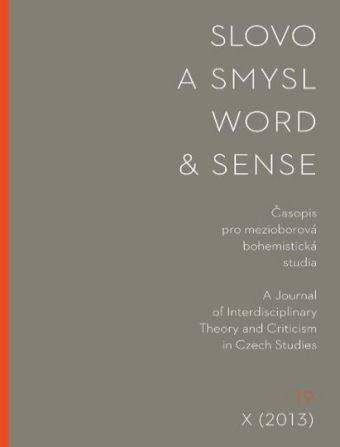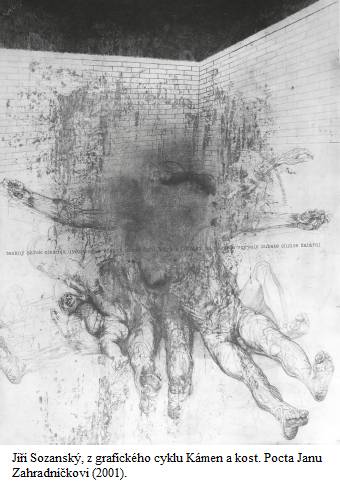Editorial
The basis for the composition of this issue of Word and Sense is the question to what extent it is possible to understand the artistic strategies of modern culture in a moment of confrontation of its artistic methods with the concept of totalitarianism. However it is necessary to point out that the term totalitarianism is not used only and exclusively in relation to a specific, historical, ideological and political fixed connection. We try to use the term in its broader sense, which is necessary and crucial for an interpretation of modern art and literature. The nature of modern and avant‑garde concepts is connected to a double perspective whose framework shows us a way to understand the term. Those concepts often tried to express new ways of capturing the world and life as a whole, connected — as Josef Vojvodík states in his answer in the section A Question for… — to a birth of a new way of perceiving artistic and human freedom. They were, of course, also connected to specific power and political methods and ambitions, escalating in the political dictatorships of the 20th century. To what extent is it possible to respect the right of modern art to express the “totalitarianism” of life in a totally new way and to what extent is it necessary to repeatedly emphasize and to consider consequences of deflection from the unstable balance of free creative expression and committed attitude, that is backed by a pressure from political “totalitarianism” and its demands? The entire 20th century witnessed an immense number of tragic cases when vivid artistic visionaries of a new integrated world became, in better cases, victims of dictatorships that they, in a certain way, helped to establish, or, in worse cases, became collaborators with regimes that massacred — both physically and mentally – hundreds of thousands of ideological opponents.
There are many ways that lead us towards an answer to this broadly based question. In the individual texts in this issue we try to offer these possible answers: The Studies section opens with the text by Berlin historian Ines Koeltzsch “Ich quatsche herum und niemand versteht mich”. The language policy of the Prague municipal council and everyday language practice in Prague during the First Republic. She interprets – in several remarkable probes — the area of the intertwining of ideology, politics and language in the space of interwar Prague. Libuše Heczková, literary historian from Prague, explores in her text Eugenics, Ecstasy and Emanuel (Rádl). The Power of Fertility and Procreativity Meets Art and Science in the 1930s the possibility of an intersection of diverse contemporary discourses, namely the discourse of sociological and philosophical disposition of avant‑garde artistic realisations. The paper of Żaneta Nalewajk The Illusionary Power of Word deals with political and social satire as well as the aesthetics of slapstick comedy as mirrored in the contemporary concept fetishism. It tries to point out possibilities of resistance of unambiguous integral artistic vision in the context of a clearly defined totalitarian regime in Sławomir Mrożek’s prosaic works. Petr Andreas, a PhD student from Prague, analyses strategies and methods of literary critique during the 1970s and 1980s that oscillated between collaboration with the totalitarian regime and an effort to defend a relatively independent space within the cultural situation in Czechoslovakia during the normalization period.
The section Drafts brings several biographic and problem oriented explorations into diverse situations of poets and artists during the period of the protectorate (Tomáš Vučka: Tragic figure of the drama of life. Poet, playwright and translator Miloš Hlávka) and during the communist dictatorship (Michal Bauer: Bizarre reality of Zdeněk Lorenc); Marika Kupková inquires into the engagement of Jiří Mařánek in post‑war film operations.
The relationship of power and art reflected on the background of literature and art in the 19th and 20th century inspires reviews and glosses in the part Critical Views as well. The section Czech Studies in the Czech Lands and Abroad brings us a report about the actual situation of Czech classes and Czech research at the Université Paris IV – Sorbonne as well as information about the Italian translation of Mácha’s Máj that is about to be published in May, accompanied by a professional colloquium at the Universita di Roma La Sapienza.
In the last part of this issue of Word and Sense we can find a translation of Julie Kristeva’s text The Tale of the Twentieth Century, which was published as a part of her books about Hannah Arendt. It brings many interesting impulses that often revise deep‑rooted clichés concerning the relationship between art and power as well as a research of totalitarian aspects of modern society and culture.
The concept and realisation of this issue was brought to life thanks to a close cooperation with the program for development of scientific disciplines at the Charles University P 09 (Literature within an intercultural context), namely with the scientific subprogram Culture and Totalitarianism.
For the Editorial team of Word and Sense
Jan Wiendl
We would like to thank Petra Johansson for translation of several texts into English.


